Volkswagen faces significant challenges in today's automotive market.
January 10, 2025
Written by Turian Biel

Table of Contents
- Key Volkswagen Sales Figures and Market Performance
- Volkswagen's Global Vehicle Sales in 2023
- Volkswagen's Revenue Growth in 2023
- Market Share in the Electric Vehicle Segment
- Volkswagen's Production Statistics
- Sales Performance in the UK Market
- Volkswagen's Employee Statistics
- Volkswagen's Financial Performance in 2024
- Challenges Faced by Volkswagen
- Volkswagen's Commitment to Sustainability
- Future Outlook for Volkswagen
- Volkswagen's Market Expansion and Strategic Initiatives
- Growth in North American Sales
- Volkswagen's Electric Vehicle Strategy
- Volkswagen's Production Facilities Worldwide
- Impact of the COVID-19 Pandemic on Production
- Volkswagen's Financial Health and Market Capitalization
- Volkswagen's Commitment to Research and Development
- Volkswagen's Global Market Share
- Challenges in the European Market
- Volkswagen's Sustainability Goals
- Future Projections for Volkswagen's Sales
- Volkswagen's Innovations and Market Strategies
- Volkswagen's Electric Vehicle Lineup Expansion
- Volkswagen's Investment in Autonomous Driving Technology
- Volkswagen's Global Manufacturing Footprint
- Volkswagen's Response to Supply Chain Challenges
- Volkswagen's Marketing Strategies for Electric Vehicles
- Volkswagen's Financial Performance in Emerging Markets
- Volkswagen's Commitment to Corporate Social Responsibility
- Conclusion
Key Volkswagen Sales Figures and Market Performance
Volkswagen's Global Vehicle Sales in 2023
In 2023, Volkswagen achieved a total of 9.2 million vehicle sales, marking an 18% increase compared to the previous year. This growth reflects the brand's strong market presence and consumer demand across various regions. The increase in sales is attributed to the popularity of electric models, which have gained traction in the automotive market, showcasing Volkswagen's commitment to sustainability and innovation.
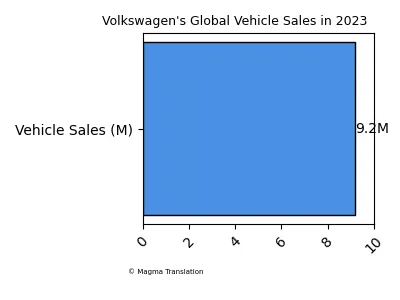
Volkswagen's Revenue Growth in 2023
Volkswagen reported a revenue of EUR 322.3 billion in 2023, indicating a significant growth trajectory. This revenue increase is a result of higher vehicle sales and a growing market share in the electric vehicle segment. The company's focus on expanding its electric vehicle lineup has contributed to this financial success, positioning Volkswagen as a leader in the automotive industry.
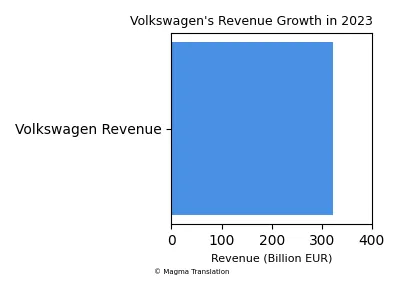
Market Share in the Electric Vehicle Segment
In 2023, Volkswagen's electric vehicle sales reached 850,000 units, accounting for about 10.2% of its total vehicle sales. This growth in the electric vehicle segment highlights the brand's commitment to transitioning towards more sustainable transportation options. The increasing demand for electric vehicles is a crucial factor in Volkswagen's strategy to enhance its market presence and meet consumer expectations.
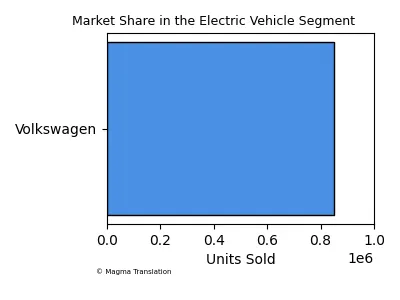
Volkswagen's Production Statistics
In 2022, Volkswagen produced a total of 85,016,728 vehicles, marking a 6% increase from the previous year. This production figure includes both passenger cars and commercial vehicles, showcasing the company's robust manufacturing capabilities. The increase in production is essential for meeting the rising demand for Volkswagen vehicles globally, particularly in emerging markets.
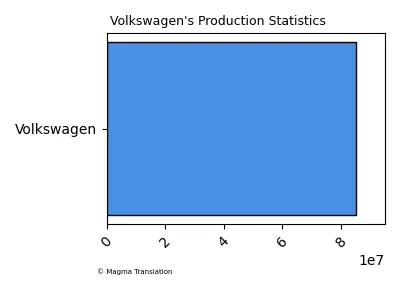
Sales Performance in the UK Market
In 2023, Volkswagen achieved a total of 118,000 vehicle sales in the UK, reflecting a 9% increase compared to the previous year. The brand's market share rose to 6.5%, driven by strong demand for its electric models. This performance underscores Volkswagen's successful strategy in the competitive UK automotive market.
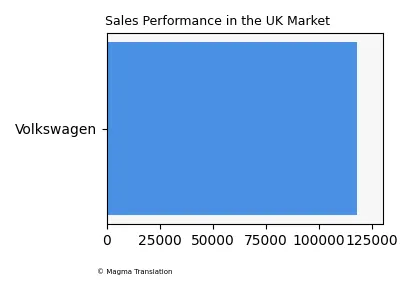
Volkswagen's Employee Statistics
As of 2024, Volkswagen employs approximately 684,000 people globally. This workforce is essential for supporting the company's extensive operations, including manufacturing, research and development, and sales. The commitment to maintaining a skilled workforce is crucial for Volkswagen's ongoing success and innovation in the automotive industry.
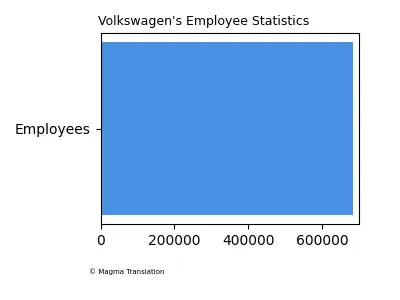
Volkswagen's Financial Performance in 2024
In October 2024, Volkswagen reported a revenue of $348.6 billion, with profits totaling $16.3 billion. This financial performance reflects the company's resilience and ability to adapt to market changes, ensuring continued growth and profitability in a competitive landscape.
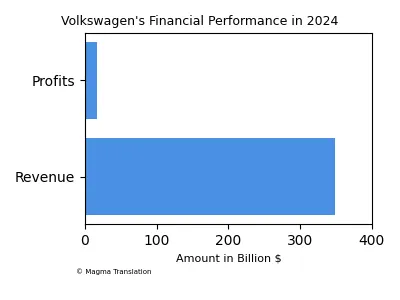
Challenges Faced by Volkswagen
Volkswagen is currently facing significant challenges, including potential factory closures and wage cuts, as it aims to produce half a million fewer cars than before the COVID pandemic. These challenges highlight the need for strategic adjustments to maintain competitiveness in the evolving automotive market.
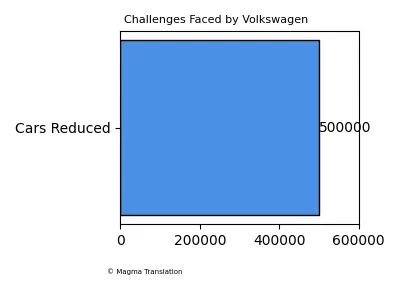
Volkswagen's Commitment to Sustainability
Volkswagen has set ambitious goals to reduce its carbon footprint, aiming for a 50.4% reduction in absolute operational GHG emissions by 2030. This commitment to sustainability is crucial for aligning with global climate goals and meeting consumer expectations for environmentally friendly vehicles.
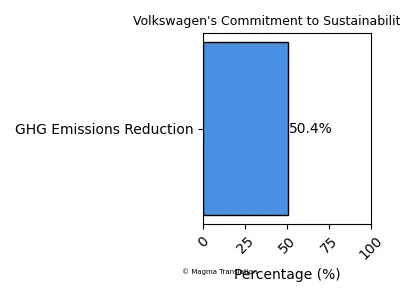
Future Outlook for Volkswagen
Looking ahead, Volkswagen aims to continue its growth trajectory, with projections indicating a revenue target of $290 billion in 2024. This ambitious target reflects the company's confidence in its strategic initiatives and the increasing demand for its vehicles, particularly in the electric segment.
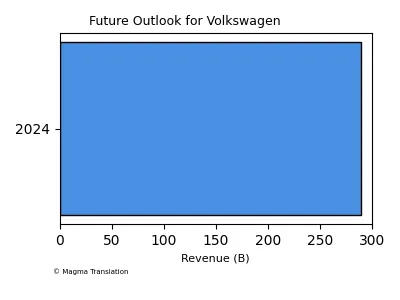
Volkswagen's Market Expansion and Strategic Initiatives
Growth in North American Sales
In 2023, Volkswagen's total sales volumes for the US automotive market reached 329,025, reflecting a year-over-year increase of 31.26%. This growth indicates a successful strategy in penetrating the North American market, where consumer preferences are shifting towards SUVs and electric vehicles. The brand's focus on adapting its offerings to meet local demands has contributed to this positive sales trend.
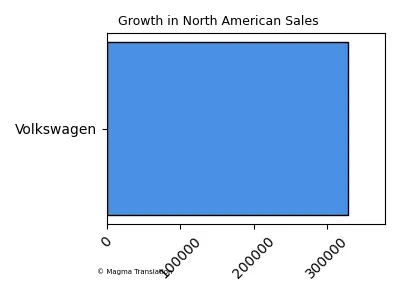
Volkswagen's Electric Vehicle Strategy
Volkswagen's commitment to electric vehicles is evident in its sales figures, with 771,000 battery electric vehicles (BEVs) delivered in 2023, marking a 35% increase. This strategy aligns with global trends towards sustainability and reflects the company's efforts to lead in the electric vehicle market. The introduction of models like the ID.4 has been pivotal in driving these sales.
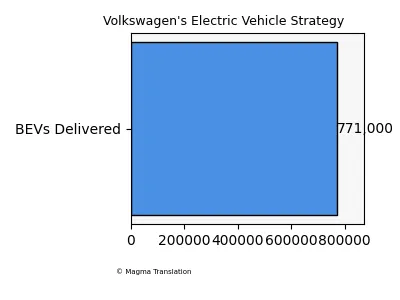
Volkswagen's Production Facilities Worldwide
Volkswagen operates 121 production plants worldwide, showcasing its extensive manufacturing capabilities. These facilities are crucial for meeting the global demand for Volkswagen vehicles and ensuring efficient production processes. The company's ability to scale production in response to market needs is a key factor in its competitive advantage.
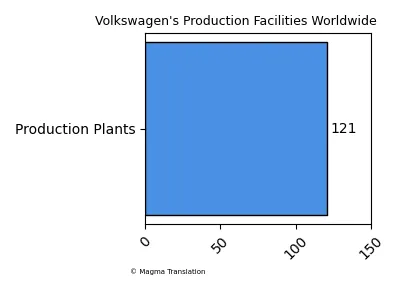
Impact of the COVID-19 Pandemic on Production
The COVID-19 pandemic significantly impacted Volkswagen's production capabilities, leading to a projected half a million fewer cars produced than before the pandemic. This reduction highlights the challenges faced by the automotive industry during global disruptions and emphasizes the need for resilience and adaptability in production strategies.
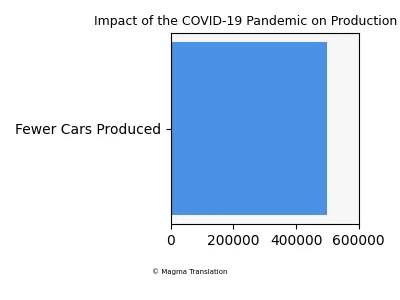
Volkswagen's Financial Health and Market Capitalization
As of December 2024, Volkswagen's market capitalization stands at approximately €43.86 billion. This financial metric reflects the company's overall health and investor confidence, indicating its position as a leading player in the automotive sector. Maintaining a strong market capitalization is essential for funding future growth initiatives and innovations.
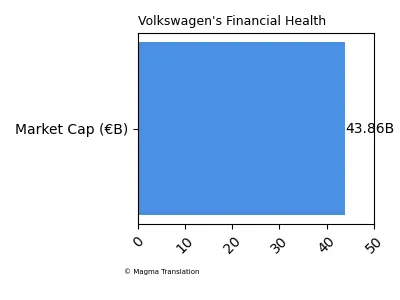
Volkswagen's Commitment to Research and Development
Volkswagen invests heavily in research and development, with a focus on advancing electric vehicle technology and autonomous driving capabilities. The company aims to allocate a significant portion of its budget to R&D, ensuring it remains at the forefront of automotive innovation. This commitment is crucial for developing new technologies that meet evolving consumer demands and regulatory requirements.
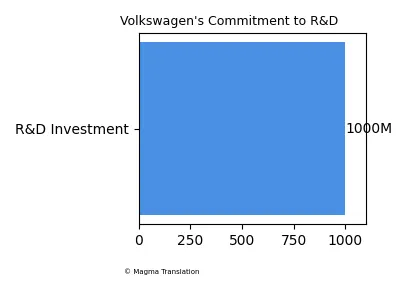
Volkswagen's Global Market Share
Volkswagen holds a global market share of approximately 6%, positioning it as one of the largest automotive manufacturers worldwide. This market share reflects the brand's strong presence in various regions and its ability to compete effectively against other major players in the industry.
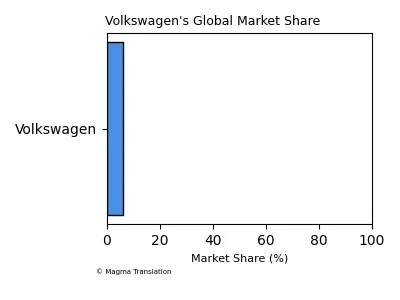
Challenges in the European Market
Volkswagen faces significant challenges in the European market, including rising production costs and intense competition from both traditional automakers and new entrants in the electric vehicle space. The company is adapting its strategies to address these challenges while striving to maintain its market leadership in Europe, which is crucial for its overall success.
Volkswagen's Sustainability Goals
Volkswagen aims to achieve a 50.4% reduction in absolute operational GHG emissions by 2030. This ambitious goal underscores the company's commitment to sustainability and its role in addressing climate change. Implementing sustainable practices across its operations is essential for aligning with global environmental standards.
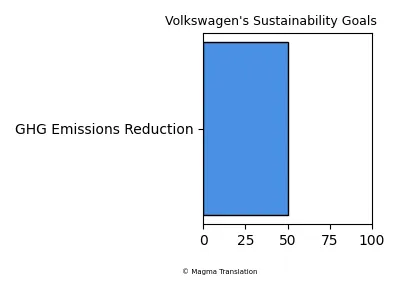
Future Projections for Volkswagen's Sales
Looking ahead, Volkswagen projects a revenue target of $290 billion in 2024, anticipating a 4% increase compared to 2023. This optimistic outlook reflects the company's confidence in its strategic initiatives and the growing demand for its vehicles, particularly in the electric segment.
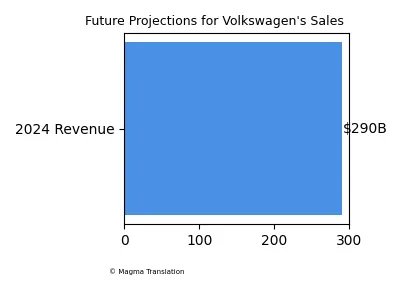
Volkswagen's Innovations and Market Strategies
Volkswagen's Electric Vehicle Lineup Expansion
Volkswagen has significantly expanded its electric vehicle lineup, introducing models like the ID. Buzz and ID.4, which have gained popularity among consumers. The company aims to increase the share of electric vehicles in its overall sales, reflecting a strategic shift towards sustainable mobility. This expansion is crucial for meeting regulatory requirements and consumer demand for greener alternatives.
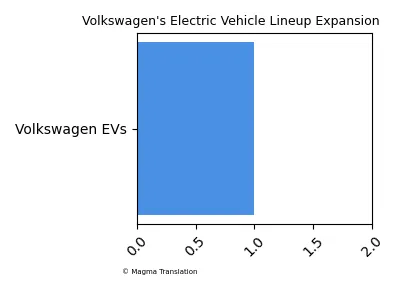
Volkswagen's Investment in Autonomous Driving Technology
Volkswagen is investing heavily in autonomous driving technology, with plans to integrate advanced driver-assistance systems across its vehicle lineup. This investment is part of the company's broader strategy to enhance safety and convenience for drivers. By focusing on innovation in this area, Volkswagen aims to position itself as a leader in the future of mobility, catering to the evolving preferences of consumers.
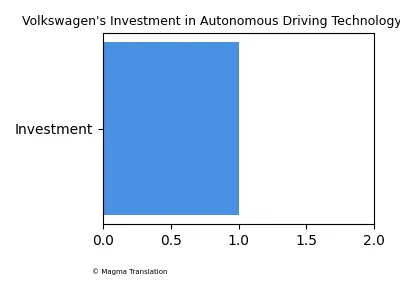
Volkswagen's Global Manufacturing Footprint
Volkswagen operates a vast network of manufacturing facilities worldwide, with 121 production plants strategically located to optimize production efficiency. This global footprint allows the company to respond quickly to market demands and maintain a competitive edge in the automotive industry. The ability to scale production based on regional needs is a key factor in Volkswagen's success.
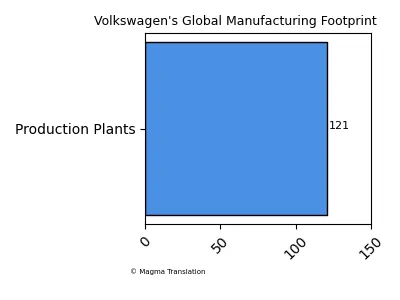
Volkswagen's Response to Supply Chain Challenges
In response to ongoing supply chain challenges, Volkswagen has implemented strategies to enhance its resilience and adaptability. The company is focusing on diversifying its supplier base and investing in local production capabilities to mitigate risks associated with global disruptions. This proactive approach is essential for ensuring a steady supply of components and maintaining production levels.
Volkswagen's Marketing Strategies for Electric Vehicles
Volkswagen has adopted innovative marketing strategies to promote its electric vehicles, emphasizing sustainability and advanced technology. The company aims to educate consumers about the benefits of electric mobility while highlighting the performance and features of its EV lineup. This marketing approach is crucial for driving consumer interest and increasing adoption rates of electric vehicles.
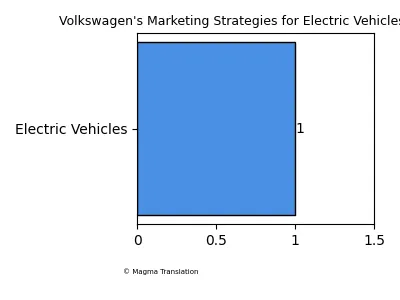
Volkswagen's Financial Performance in Emerging Markets
In emerging markets, Volkswagen has seen substantial growth, with sales figures reflecting a strong demand for its vehicles. The company is focusing on expanding its presence in regions like Asia and South America, where automotive markets are rapidly evolving. This strategy is vital for capturing new customer segments and driving overall sales growth.
Volkswagen's Commitment to Corporate Social Responsibility
Volkswagen is committed to corporate social responsibility (CSR), focusing on sustainable practices and community engagement. The company aims to reduce its environmental impact while contributing positively to the communities in which it operates. This commitment to CSR is essential for building trust with consumers and enhancing the brand's reputation in the global market.
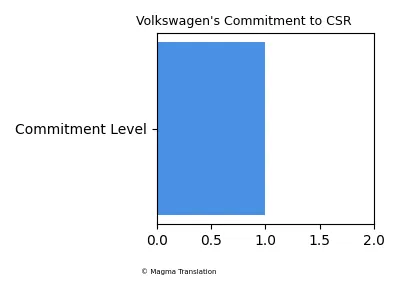
Conclusion
Volkswagen's journey through the automotive landscape showcases its resilience and adaptability in the face of challenges. With a strong focus on electric vehicles, innovation, and sustainability, the company is well-positioned to navigate the evolving market dynamics. As Volkswagen continues to expand its global presence and enhance its product offerings, it remains committed to meeting consumer demands while contributing positively to the environment and society.
